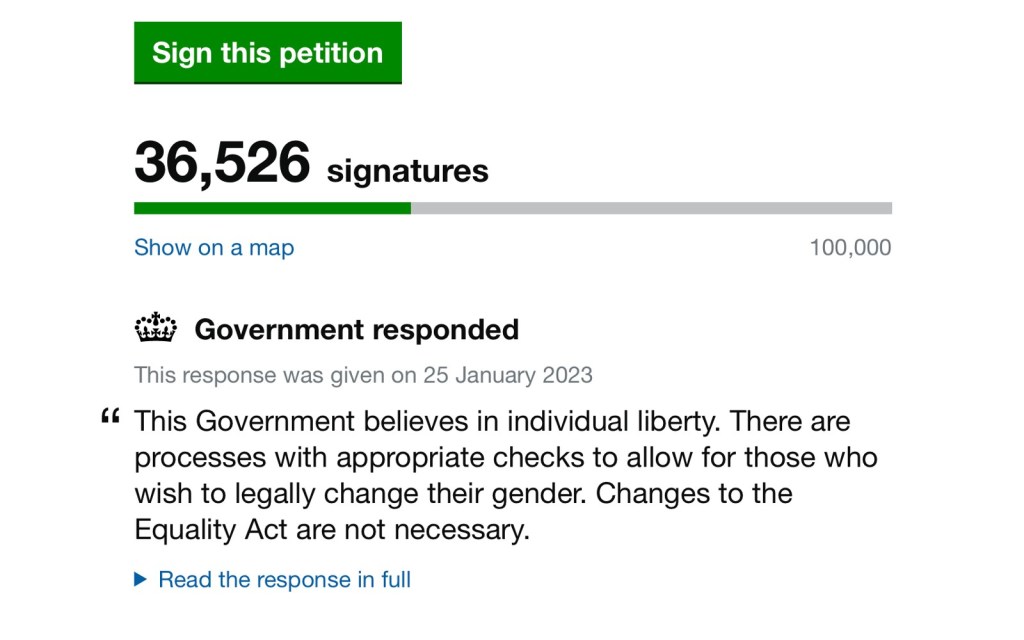UK government claimed there was ‘no need to reform the Equality Act’ just two months ago

Kemi Badenoch wrote to the EHRC requesting guidance on defining ‘sex’ in the Equality Act. (Getty)
Kemi Badenoch wrote to the EHRC requesting guidance on defining 'sex' in the Equality Act. (Getty)
The UK government claimed there was “no need” to reform the Equality Act in January 2023, just weeks before Kemi Badenoch sought advice on a potential amendment.
It emerged on Tuesday (4 April) that Badenoch, the equalities minister, asked the Equality and Human Rights Commission (EHRC) for its advice on the “benefits or otherwise” of amending the Equality Act to define sex as “biological”.
She wrote to the EHRC on 21 February, with the watchdog publishing its advice this week.
Just four weeks before she sent the letter, the UK government issued a response to a petition asking it to “commit to not amending the Equality Act’s definition of sex”.
At the time, the government stated it believed in “individual liberty” and proclaimed that “changes to the Equality Act are not necessary”.
The petition currently has more 30,000 signatures – 10,000 triggers an official response, and at 100,000 it will be considered for a debate in parliament
As the petition explains: “Currently, the [Equality] Act protects trans people from discrimination on the basis of both sex and ‘gender reassignment’, regardless of whether they have undergone medical transition or hold a Gender Recognition Certificate. It can allow trans people to access single-sex spaces such as DV shelters, bathrooms and hospital wards.
“The proposed change would remove a legal protection for trans people and encourage discrimination.”
In its response the government claimed it is “committed to upholding Britain’s long-standing record of protecting the rights of individuals against unlawful discrimination”, and said the act “makes it clear that providers have the right to restrict use of spaces on the basis of sex and gender reassignment where this is justified”.

Following the EHRC publishing its advice on changing the definition of sex in the Equality Act, the government has said it is considering its options. It’s understood no decision has been made.
In its letter, EHRC said the government should carefully consider that any change could have “possible disadvantages for trans men and trans women”.
The letter went on to say: “There is no straightforward balance, but we have come to the view that if ‘sex’ is defined as biological sex for the purposes of Equality Act, this would bring greater legal clarity.”
The letter, from EHRC chairwoman, Baroness Kishwer Falkner, acknowledged that currently, trans men and women who hold a Gender Recognition Certificate (GRC) have their gender recognised as their legal sex.
Changing the definition of sex is likely to render the certificates useless.
“As things stand, a women’s book club, for instance, may have to admit a trans woman who had obtained a GRC,” Falkner wrote.
“On the biological definition, it could restrict membership to biological women.”
In the letter, the EHRC considers potential disadvantages to the change, including that a trans man would be able to bring an equal pay claim by citing a cis male being paid more, and that a trans man would be able to bring a direct or indirect sex discrimination claim “as a woman”.
The EHRC told PinkNews it suggests “the UK Government carefully identify and consider the potential implications” of any change to the Equality Act.
‘Nonsense on stilts’
News of the advice brought criticism from advocates, and some telling PinkNews they are horrified by the idea of potential changes.
Former EHRC employees have also spoken out, including Grey Collier, a former EHRC legal director, who called the idea of changing the Equality Act to define sex as biological “legally illiterate”.
Writing on Twitter, Collier said: “The proposed change in the law is nonsense on stilts. The suggestion is legally illiterate, unworkable and is just another way of using trans people’s actual lives as a pawn in the culture wars.
“It would overturn some of the purposes of the Gender Recognition Act and make it possible to discriminate against trans people in a whole range of circumstances where it is currently outlawed.”
Collier also branded the advice unutterably cruel and asked politicians and organisations to leave trans people alone.
In addition to the legal inconsistencies of the advice, Collier pointed out that it would whip up even more hatred and even accused the government of appeasement of hate groups.
“It’s dangerous, even life-threatening,” he said.
“Due to the hostility whipped up by a few vocal anti-trans activists and most mainstream media outlets, many trans people already live in fear of being attacked just going about our daily lives.”
In February, 20 LGBTQ+ organisations, including Stonewall, called for the independent status of the EHRC to be removed by the UN.
Stonewall UK chief executive, Nancy Kelley, said: “Independent human rights institutions have a duty to protect and promote all of our rights without fear or favour. The EHRC is not fulfilling that duty, which is a sad and frightening thing for all of us who have experienced discrimination and abuse.”
The attempt failed.

